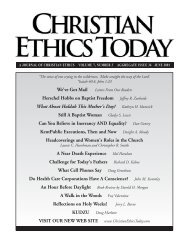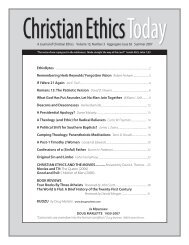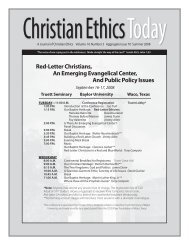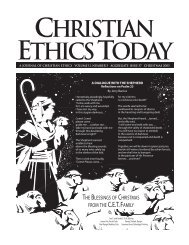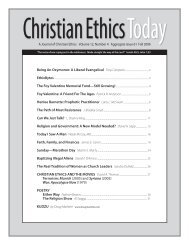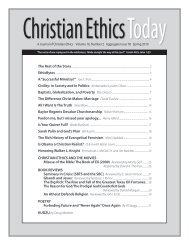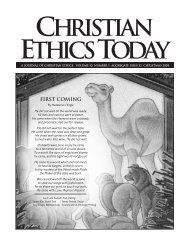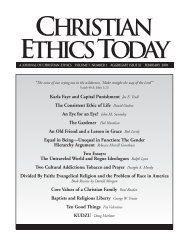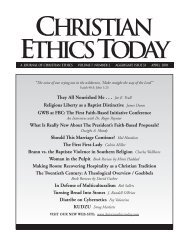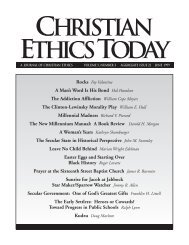Issue 048 PDF Version - Christian Ethics Today
Issue 048 PDF Version - Christian Ethics Today
Issue 048 PDF Version - Christian Ethics Today
Create successful ePaper yourself
Turn your PDF publications into a flip-book with our unique Google optimized e-Paper software.
in your church. They are not looking for programs or<br />
“touchy feely” homilies. They want to know if they will be<br />
invited to your table.<br />
Second, Latinos are inclined and perhaps predisposed to<br />
defend and protect the unity of the family of faith. I know<br />
Latinos are well known for our ability to fight. What I am<br />
saying is this . . . once you form a spiritual family, Latinos are<br />
usually ready to go down with you. Loyalty, unity, and a<br />
common sense of purpose folded into this meaning of familia.<br />
If my congregation becomes familia to me, you will not<br />
find a more fierce and loyal follower. I think we could use a<br />
greater sense of loyalty, unity, and oneness these days as we<br />
consider discipleship in the context of the family. Among<br />
Latinos, unity is like honey for the soul.<br />
Finally, Latinos are used to a mestizaje, or identity. That<br />
is, we are used to pursing our emerging identity sociologically,<br />
geo-politically, and economically. We are open to a new<br />
identity in Christ. We bring with us our Catholic heritage<br />
(now over 500 years old) and the richness of our culture, to<br />
the idea of becoming part of the Jesus family. We are ready to<br />
critique our culture against the teaching of Jesus and emerge<br />
with a new cultural identity that in not Hispanic or<br />
American, but more like Jesus. It is at this precise place that<br />
we struggle to develop new disciples in the many choices we<br />
make daily.<br />
How does familia inform our effort to develop biblically<br />
authentic families? By moving toward a collective worldview<br />
and emphasizing belonging to people who are disconnected.<br />
By valuing loyalty and unity in community. And finally, by<br />
advancing the emerging identity we have in Christ. ■<br />
1 William Marsden, The Mexican-American of South Texas<br />
(New York: Holt, Rinehart, and Winston 1964), 44.<br />
2 John Condon, Good Neighbors: Communicating with the<br />
Mexicans (Yarmouth, Maine: Intercultural Press), 24.<br />
3 Marvin K. Mayers, A Look at Latin American Lifestyles<br />
(Huntington Beach, Ca.: Summer Institute of Linguistics<br />
1876), 57.<br />
4 Ibid, 56.<br />
5 Marco A. Espinoza, “Pastoral Care of Hispanic Families in<br />
the United States: Socio-Cultural, Psychological, and<br />
Religious Considerations,” (DMin Project, Andover<br />
Newton Theological Seminary 1982), 126.<br />
6 David T. Abalos, Latinos in the United States: The Sacred<br />
and the Political (Notre Dame: University of Notre Dame<br />
Press 1986), 66.<br />
7 Mayers, 53.<br />
8 Madsen, 52.<br />
9 Rodney Clapp, Families at the Crossroads: Beyond<br />
Traditional and Modern Options (Chicago: InterVarsity<br />
Press 1993), 81.<br />
10 Ibid, 82.<br />
8 • FEBRUARY 2004 • CHRISTIAN ETHICS TODAY<br />
My Hope For<br />
Baptists In 2004<br />
President Jimmy Carter,<br />
Plains, GA<br />
Note: This article first appeared in The Baptist Studies<br />
Bulletin, published online January 15, 2004, at their website:<br />
www.mercer.edu/baptiststudies/ .<br />
Afew years ago, I invited about a dozen moderate Baptist<br />
leaders and an equal number of more conservative ones to<br />
The Carter Center, including ten men who had been or would be<br />
presidents of the Southern Baptist Convention. My hope was that<br />
the two groups might be reconciled enough to work together harmoniously.<br />
There was no acrimony during two extended meetings,<br />
and we produced a positive public statement at the time.<br />
Unfortunately, subsequent events have erased much of the<br />
good will we expressed, and we now find ourselves separated—or<br />
fragmented—over a few secular issues despite our common faith<br />
in Jesus Christ as Savior. Mission work suffers and our reputations<br />
are tarnished as a great portion of our attention is focused on the<br />
adoption of what some consider to be imposed creed and others a<br />
necessary expression of common belief. There are sharp divisions<br />
over the “submission” of women or their equal treatment in<br />
church affairs. Some have exalted the sinfulness of homosexuality<br />
to the highest pinnacle of importance, while others point out that<br />
Jesus never mentioned this issue and it is a genetic or innate inherited<br />
trait that should not exclude gays from <strong>Christian</strong> fellowship.<br />
It has become increasingly obvious that we cannot ignore or<br />
minimize these disagreements. I don’t have any authority and lack<br />
the influence and objectivity necessary to initiate another reconciliation<br />
effort, but my hope for the New Year is that the differences<br />
might be relegated to a completely secondary status as we<br />
Baptists consider our obligation to work in harmony to fulfill the<br />
mandate given to us by Jesus.<br />
There is a notable precedent for <strong>Christian</strong>s to absorb strong<br />
differences and still work together to further God’s kingdom.<br />
Some believers in the early church were convinced that the path<br />
to salvation had to lead through the adoption of Jewish religious<br />
customs including circumcision. Others thought that the eating<br />
of meat sacrificed to idols was very important, and there were<br />
divisive debates about whether Jesus could be both fully human<br />
and also the Son of God.<br />
The church survived when the fundamentals of our faith<br />
offered an adequate bond to unite the fallible and argumentative<br />
<strong>Christian</strong>s. Perhaps, once again, Baptists might be reconciled<br />
through emulating the actions and teachings of Christ, based on<br />
justice, peace, humility, service, forgiveness, and unselfish love. Is<br />
it too much to hope for this kind of miracle? ■



